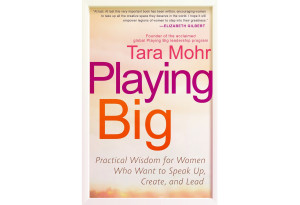The Good News About Your Inner Critic
We've all been told we can silence that harsh voice in our heads—if we try. But what if there’s an easier way to stop yelling at ourselves? The author of Playing Big explains....

Photo: Oliya Nizamutdinova/Getty Images
I recently had lunch with a colleague—an executive coach and business consultant. She's worked at the most prestigious consulting companies. Over our meal, she explained to me that she wanted to do more public speaking. She sounded eager and ready to go, uncertain only about what practical steps to take next.
I offered to introduce her to a few speaking agents who I thought would love to work with her. Suddenly, she started talking about how she needed to spend some months doing small, local talks to "hone her craft." A new narrative came out, about how she wasn't really ready to take her speaking to a large stage. Having just watched a video of her giving a speech, I knew this wasn't the case.
I was hearing in her something I've now heard in hundreds of women. I think of it as "the voice of not-me"— the internal chatter that tells a woman she's not ready to lead, she's not enough of an expert, she's not good enough at this or that. It's the voice of self-doubt, of the inner critic.
All women grapple with this voice of self-doubt in one way or another. For some women, it is most prominent around their professional lives. For others, it comes up around their sense of competence as mothers or partners. For others, it speaks mostly about appearance, body image or aging. And for others, it chatters most loudly about their creative dreams—to make music or paint or write. We are so used to living with this voice that most of us don't imagine it could be otherwise. It's become the background noise we live with. Since women don't talk to one another about the most vicious things it says, we don't hear counterarguments or get support, and we don't learn that other women—women we admire because they seem so confident—hear the same irrational, harsh voice in their heads, too.
The costs of women's self-doubt are enormous. Think of all the ideas unshared, businesses not started, important questions not raised, talents unused. Think of all the fulfillment and joy not experienced because self-doubt keeps us from going for the opportunities that would bring that joy and fulfillment.
The good news is less well-known: While "confidence issues" seem complex and difficult to address, they don't need to be. It turns out you don't have to find a magic source of confidence, dig deep into childhood wounds to find the roots of your insecurities or figure out how to permanently banish that critical voice in your head. Instead, you simply need to learn how to live with the inner voice of self-doubt but not be held back by it, to hear the voice and not take direction from it.
The inner critic is an expression of the safety instinct in us—the part of us that wants to stay safe from potential emotional risk—from hurt, failure, criticism, disappointment or rejection by the tribe. The safety instinct is cunning. If it simply said to you, "No, don't compose the song, don't run for office, don't make the career change, don't share your ideas— it's too risky," you wouldn't listen. You'd probably reply with something along the lines of, "No, I feel okay about the risks. Here I go." So the safety instinct uses a more effective argument: "Your paintings are terrible." "Your book won't offer anything new—there are so many books on the subject." "Your attempt at a career change will cause you to end up broke." The inner critic speaks up with more viciousness and volume when we are exposing ourselves to a real or perceived vulnerability—something that triggers a fear of embarrassment, rejection, failure or pain.
Many women find their inner critic speaks up most loudly around their most deeply felt dreams for their lives and work, because we feel particularly vulnerable about them. They experience the most panicky, overwhelming self-doubt when they are moving toward what they truly long to do. The inner critic is like a guard at the edge of your comfort zone. As long as you don't venture forth out of that zone, the inner critic can leave you alone—like a guard taking a nap. Yet when you approach the edge of your comfort zone, test old beliefs, contemplate change or stretch into playing bigger, you wake the sleeping guard. The inner critic recites its lines in an attempt to get you to go back into the familiar zone of the status quo.
Now let's turn to what you can do day to day, moment to moment. It almost seems too easy, but it's true: You don't have to do all that much. Recognizing the critic's voice consciously is often enough to immediately snap us out of its trance.
Why is noticing and naming the voice of self-doubt so powerful? Liberating yourself depends on a very simple insight. You are not the critical voice. You are the person aware of the critical voice. You are the person feeling perplexed by it or bummed out by it or believing it. You are the person trying to understand it and work with it and get rid of it. You are the entity that is hearing the voice. The critic is not the core of you. The core of you is the you of your aspirations, of your wisdom.
As you name the inner-critic voice when it shows up, you begin to unbraid it from the other strands of "you": your imagination, your aspirations, your wisdom. By saying, "Oh, I'm hearing the critic right now," you can remember that that's all it is and move forward despite its rants and threats.
 This article was excerpted from Playing Big by Tara Mohr. By arrangement with Avery, a member of Penguin Group (USA) LLC, A Penguin Random House Company. Copyright © Tara Mohr, 2014.
This article was excerpted from Playing Big by Tara Mohr. By arrangement with Avery, a member of Penguin Group (USA) LLC, A Penguin Random House Company. Copyright © Tara Mohr, 2014.
I offered to introduce her to a few speaking agents who I thought would love to work with her. Suddenly, she started talking about how she needed to spend some months doing small, local talks to "hone her craft." A new narrative came out, about how she wasn't really ready to take her speaking to a large stage. Having just watched a video of her giving a speech, I knew this wasn't the case.
I was hearing in her something I've now heard in hundreds of women. I think of it as "the voice of not-me"— the internal chatter that tells a woman she's not ready to lead, she's not enough of an expert, she's not good enough at this or that. It's the voice of self-doubt, of the inner critic.
All women grapple with this voice of self-doubt in one way or another. For some women, it is most prominent around their professional lives. For others, it comes up around their sense of competence as mothers or partners. For others, it speaks mostly about appearance, body image or aging. And for others, it chatters most loudly about their creative dreams—to make music or paint or write. We are so used to living with this voice that most of us don't imagine it could be otherwise. It's become the background noise we live with. Since women don't talk to one another about the most vicious things it says, we don't hear counterarguments or get support, and we don't learn that other women—women we admire because they seem so confident—hear the same irrational, harsh voice in their heads, too.
The costs of women's self-doubt are enormous. Think of all the ideas unshared, businesses not started, important questions not raised, talents unused. Think of all the fulfillment and joy not experienced because self-doubt keeps us from going for the opportunities that would bring that joy and fulfillment.
The good news is less well-known: While "confidence issues" seem complex and difficult to address, they don't need to be. It turns out you don't have to find a magic source of confidence, dig deep into childhood wounds to find the roots of your insecurities or figure out how to permanently banish that critical voice in your head. Instead, you simply need to learn how to live with the inner voice of self-doubt but not be held back by it, to hear the voice and not take direction from it.
The inner critic is an expression of the safety instinct in us—the part of us that wants to stay safe from potential emotional risk—from hurt, failure, criticism, disappointment or rejection by the tribe. The safety instinct is cunning. If it simply said to you, "No, don't compose the song, don't run for office, don't make the career change, don't share your ideas— it's too risky," you wouldn't listen. You'd probably reply with something along the lines of, "No, I feel okay about the risks. Here I go." So the safety instinct uses a more effective argument: "Your paintings are terrible." "Your book won't offer anything new—there are so many books on the subject." "Your attempt at a career change will cause you to end up broke." The inner critic speaks up with more viciousness and volume when we are exposing ourselves to a real or perceived vulnerability—something that triggers a fear of embarrassment, rejection, failure or pain.
Many women find their inner critic speaks up most loudly around their most deeply felt dreams for their lives and work, because we feel particularly vulnerable about them. They experience the most panicky, overwhelming self-doubt when they are moving toward what they truly long to do. The inner critic is like a guard at the edge of your comfort zone. As long as you don't venture forth out of that zone, the inner critic can leave you alone—like a guard taking a nap. Yet when you approach the edge of your comfort zone, test old beliefs, contemplate change or stretch into playing bigger, you wake the sleeping guard. The inner critic recites its lines in an attempt to get you to go back into the familiar zone of the status quo.
Now let's turn to what you can do day to day, moment to moment. It almost seems too easy, but it's true: You don't have to do all that much. Recognizing the critic's voice consciously is often enough to immediately snap us out of its trance.
Why is noticing and naming the voice of self-doubt so powerful? Liberating yourself depends on a very simple insight. You are not the critical voice. You are the person aware of the critical voice. You are the person feeling perplexed by it or bummed out by it or believing it. You are the person trying to understand it and work with it and get rid of it. You are the entity that is hearing the voice. The critic is not the core of you. The core of you is the you of your aspirations, of your wisdom.
As you name the inner-critic voice when it shows up, you begin to unbraid it from the other strands of "you": your imagination, your aspirations, your wisdom. By saying, "Oh, I'm hearing the critic right now," you can remember that that's all it is and move forward despite its rants and threats.
 This article was excerpted from Playing Big by Tara Mohr. By arrangement with Avery, a member of Penguin Group (USA) LLC, A Penguin Random House Company. Copyright © Tara Mohr, 2014.
This article was excerpted from Playing Big by Tara Mohr. By arrangement with Avery, a member of Penguin Group (USA) LLC, A Penguin Random House Company. Copyright © Tara Mohr, 2014.



